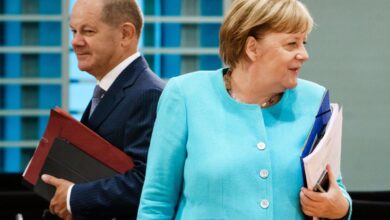
Whats Next for Britain and the EU?
Whats next for britain and the eu – What’s next for Britain and the EU? That’s the million-dollar question, isn’t it? Brexit’s seismic impact continues to reverberate across the political and economic landscapes of both entities. From navigating complex trade deals and addressing the thorny Northern Ireland Protocol to charting a course for future cooperation on security and immigration, the UK and EU face a series of intertwined challenges and opportunities.
This post delves into the key areas shaping their evolving relationship, exploring potential scenarios and examining the hurdles they must overcome to forge a sustainable future together.
We’ll unpack the current state of UK-EU trade, analyzing its economic consequences and exploring potential pathways for future negotiations. We’ll also examine the level of political cooperation, investigating areas of both collaboration and friction, from tackling climate change to maintaining security. The Northern Ireland Protocol, a persistent point of contention, will be examined in detail, alongside the ongoing debate surrounding immigration and the free movement of people.
Finally, we’ll look at security and defense cooperation, exploring potential joint initiatives and the challenges ahead.
Political Cooperation
Post-Brexit relations between the UK and the EU are complex, particularly regarding political cooperation. While the two entities share a geographical proximity and a history of intertwined interests, their approaches to international relations differ significantly, impacting the level of cooperation on various fronts. The current state of affairs is a mixture of pragmatic collaboration and strategic divergence, shaped by competing national interests and differing geopolitical visions.The current level of political cooperation between the UK and the EU on security and foreign policy is arguably limited, though not entirely absent.
Security cooperation, particularly concerning counter-terrorism and intelligence sharing, continues at some level, driven by shared threats. However, the absence of a formal framework comparable to the pre-Brexit arrangements significantly hinders seamless information exchange and coordinated action. Foreign policy alignment is even more tenuous, with the UK pursuing an independent foreign policy that often diverges from the EU’s unified approach.
Security Cooperation
The UK and the EU continue to cooperate on specific security issues, though the mechanisms are less formal and efficient than before Brexit. Information sharing remains crucial, particularly regarding counter-terrorism efforts. However, the UK’s departure from the EU’s security and defence structures has resulted in a loss of immediate access to certain intelligence networks and joint operations. This has led to a more ad-hoc approach, relying on bilateral agreements and case-by-case collaborations.
The potential for future cooperation exists, but it hinges on the willingness of both sides to overcome bureaucratic hurdles and address mutual concerns regarding data protection and national sovereignty. The success of future collaborations will depend on the establishment of clear protocols and mechanisms for efficient information exchange and joint decision-making.
So, what’s next for Britain and the EU? The ongoing trade negotiations are certainly a key factor, but honestly, global politics are so unpredictable. For example, check out this surprising development: trump overtakes harris in our forecast. This shift in the US political landscape could significantly impact the future trajectory of both the UK and EU, adding another layer of complexity to an already intricate situation.
Foreign Policy Approaches
The UK and the EU exhibit distinct approaches to international relations. The EU generally favours multilateralism, seeking to address global challenges through international cooperation and institutions. The UK, while participating in multilateral forums, has adopted a more independent and pragmatic approach, prioritizing its national interests and forging bilateral relationships. This difference in approach is visible in their stances on various global issues, ranging from climate change to trade negotiations.
So, what’s next for Britain and the EU? A lot hinges on future trade deals, of course, but the changing landscape of travel is also a huge factor. It’s clear that, as this article points out, europe is bidding a steady farewell to passport-free travel , and this will undoubtedly impact the ease of movement between the UK and the EU, further shaping the post-Brexit relationship.
The long-term implications for both sides are still unfolding.
While there are areas of convergence, such as the shared goal of promoting democracy and human rights, the methods employed often differ, leading to occasional disagreements and missed opportunities for coordinated action. For example, while both entities support the Ukraine against Russian aggression, their approaches to sanctions and military aid may differ slightly.
Collaboration on Shared Challenges
Despite their differing approaches, both the UK and the EU face common challenges, such as climate change and terrorism, requiring collaborative efforts for effective solutions. Climate change necessitates international cooperation to reduce emissions and adapt to its effects. The UK and the EU could collaborate on developing and implementing innovative technologies for renewable energy, carbon capture, and climate resilience.
So, what’s next for Britain and the EU? The ongoing fallout from Brexit continues to shape their relationship, but geopolitical events like the Nord Stream pipeline sabotage are adding another layer of complexity. The fact that sweden confirms traces of explosives at the Nord Stream pipeline blast site highlights the volatile security landscape impacting both the UK and EU, potentially influencing future collaborations and policy decisions.
This shared challenge could unexpectedly foster closer ties, or further complicate an already tense situation.
Similarly, counter-terrorism requires information sharing and coordinated efforts to disrupt terrorist networks and prevent attacks. The potential for collaboration exists, but it requires addressing the lingering mistrust and establishing clear communication channels. Both sides need to find ways to balance their national interests with the need for collective action.
Joint Initiative: A Green Energy Technology Partnership, Whats next for britain and the eu
A hypothetical joint initiative could focus on developing and deploying green energy technologies. The objectives would be to accelerate the transition to renewable energy sources, reduce carbon emissions, and create new economic opportunities. The implementation strategy would involve joint research and development projects, shared funding mechanisms, and the harmonization of regulatory frameworks. This initiative would necessitate establishing a dedicated task force with representatives from both the UK and the EU, regular meetings to monitor progress, and transparent reporting mechanisms to ensure accountability.
Successful implementation requires a commitment from both sides to overcome political obstacles and prioritize the shared goal of combating climate change. This could include sharing expertise on offshore wind technology, which the UK has considerable experience in, and pooling resources for the development of next-generation solar panels, where EU nations may have stronger expertise.
Northern Ireland Protocol

The Northern Ireland Protocol, a key component of the Brexit withdrawal agreement, has proven to be one of the most contentious aspects of the UK’s departure from the European Union. Designed to avoid a hard border on the island of Ireland, it has instead created a de facto customs border in the Irish Sea, leading to significant economic and political challenges.The protocol’s core issue lies in its creation of a complex system for managing the flow of goods between Great Britain and Northern Ireland.
This has led to increased bureaucracy, delays, and costs for businesses, impacting trade and investment. Furthermore, the protocol has fuelled political tensions, with unionists feeling their place within the United Kingdom is being undermined by closer ties between Northern Ireland and the EU. The Democratic Unionist Party (DUP), a major unionist party, has refused to participate in the Northern Ireland power-sharing executive until the issues surrounding the protocol are resolved.
Economic Impacts of the Northern Ireland Protocol
The economic consequences of the protocol are multifaceted. Increased customs checks and paperwork have added significant costs for businesses involved in cross-border trade. This has particularly impacted smaller businesses, which lack the resources to navigate the complex new regulations. Furthermore, the protocol has disrupted supply chains, leading to shortages of certain goods in Northern Ireland. The divergence in regulatory standards between Great Britain and the EU has also raised concerns about the long-term competitiveness of Northern Irish businesses.
For example, the inability to easily access the Great British market for certain goods produced under EU standards has hampered growth in specific sectors.
Potential Solutions to the Protocol Issues
Several solutions have been proposed to address the challenges posed by the Northern Ireland Protocol. These range from minor adjustments to the existing agreement to a complete overhaul. Finding a solution requires careful consideration of the interests of all stakeholders, including the UK government, the EU, the Northern Ireland Executive, and the wider population of Northern Ireland. Any viable solution must balance the need to protect Northern Ireland’s place within the UK internal market with the need to maintain peace and stability on the island of Ireland.
Comparison of Proposed Solutions
The following table compares three proposed solutions: a revised protocol with reduced customs checks, a new agreement based on a technological solution for border management, and a complete abandonment of the protocol.
| Solution Name | Benefits | Drawbacks | Likelihood of Success |
|---|---|---|---|
| Revised Protocol (Reduced Checks) | Reduced bureaucracy and costs for businesses; improved trade flows; lessened political tensions. | May not fully address concerns about sovereignty; potential for continued friction with the EU. | Moderate – depends on the extent of concessions from both sides. |
| Technological Solution (Data Sharing) | Minimally disruptive to trade; maintains closer ties with the EU; avoids a hard border. | Requires significant investment in technology and infrastructure; potential for data security concerns. Successful implementation relies heavily on technological capabilities and trust between parties. | Low – requires significant technological advancements and political will from all parties. |
| Abandonment of the Protocol | Removes the de facto border in the Irish Sea; potentially simplifies trade between Great Britain and Northern Ireland. | Risks undermining the Good Friday Agreement; potential for a return to a hard border on the island of Ireland; significant damage to UK-EU relations. | Low – highly unlikely given the EU’s commitment to maintaining the integrity of the single market and the peace process. |
A Proposed Compromise for Resolving Key Issues
A balanced approach is needed, incorporating elements from different proposals. A revised protocol, focusing on reducing unnecessary customs checks through streamlined processes and improved data sharing, offers a realistic path forward. This would require a commitment from both the UK and the EU to find creative solutions, such as leveraging technology to facilitate frictionless trade while maintaining the necessary regulatory safeguards.
Crucially, this revised protocol should incorporate mechanisms to address the concerns of unionists, ensuring their place within the UK is not undermined. This could involve a clear commitment to addressing issues related to Northern Ireland’s identity and governance within the UK framework. The ultimate success hinges on a genuine commitment from all stakeholders to finding common ground and prioritizing the long-term stability and prosperity of Northern Ireland.
Immigration and Movement of People
Brexit fundamentally reshaped the movement of people between the UK and the EU. The free movement of people, a cornerstone of EU membership, ended for UK citizens, impacting both those already residing in the EU and those seeking to move there, and vice-versa for EU citizens in the UK. This shift has had profound consequences for both economies and societies, necessitating new immigration policies and frameworks.
Impact of Brexit on the Movement of People
The end of free movement led to the introduction of a points-based immigration system in the UK, prioritizing skilled workers and those meeting specific criteria. This contrasts sharply with the previous system, where EU citizens could move freely to the UK for work or residence. For EU citizens already in the UK, the Withdrawal Agreement established a settled status scheme, allowing them to maintain their residency rights.
However, the application process proved complex for many, and some individuals faced difficulties securing their status. Conversely, UK citizens in the EU now face varying residency requirements depending on the individual member state’s regulations, resulting in a less straightforward process than previously existed. The overall impact has been a significant reduction in the net migration of EU citizens to the UK and a change in the demographic composition of both the UK and various EU nations.
Comparison of UK and EU Immigration Policies
The UK’s points-based system emphasizes skills and qualifications, aiming to attract high-skilled workers and fill labor shortages. The EU, while not having a single, unified immigration policy, generally employs a combination of national quotas and free movement within the Schengen Area (for many member states). Similarities include a focus on combating illegal immigration and ensuring national security. However, key differences exist in the emphasis on specific skill sets, the level of control exerted over immigration flows, and the treatment of asylum seekers.
The UK’s system is arguably more restrictive, while the EU’s approach is more varied, reflecting the diverse needs and priorities of its individual member states.
Potential Scenarios for Future Immigration Policies
Several factors will shape future immigration policies on both sides. Labor shortages across various sectors in the UK, particularly in healthcare and agriculture, may necessitate adjustments to the points-based system to attract more workers. Demographic changes, including aging populations in both the UK and several EU countries, will also influence immigration policies. One scenario involves a greater emphasis on attracting skilled workers from outside the EU to address labor shortages, while another involves increased cooperation between the UK and EU on tackling illegal immigration.
A third potential scenario could see a gradual relaxation of UK immigration rules for certain sectors facing severe labor shortages, potentially involving targeted agreements with specific EU countries. The EU, in turn, might face pressure to streamline its own immigration policies to better address its demographic challenges and labor needs.
Hypothetical Immigration Agreement Between the UK and EU
A hypothetical agreement could establish a streamlined process for the mutual recognition of professional qualifications, facilitating the movement of skilled workers. It could include quotas for specific sectors facing labor shortages, with mechanisms for regular review and adjustment based on economic needs. The agreement could also address the issue of seasonal workers, establishing clear pathways for temporary migration.
Furthermore, it might include provisions for the exchange of information on illegal immigration and cooperation on border security. Implementation could involve joint working groups to monitor the effectiveness of the agreement and address any emerging challenges. Dispute resolution mechanisms would be crucial, potentially involving arbitration or a joint committee. Such an agreement would require political will on both sides and would need to balance the UK’s desire for control over its borders with the EU’s interest in facilitating labor mobility.
Security and Defense Cooperation: Whats Next For Britain And The Eu

Post-Brexit, the UK and the EU maintain a complex relationship regarding security and defense. While no longer bound by the same institutional frameworks, both sides recognize the shared threats and the benefits of continued collaboration. The level of cooperation is arguably less extensive than during the UK’s EU membership, but significant interaction persists, driven by pragmatic necessity and mutual interest.The current level of cooperation is characterized by a mix of formal agreements and informal exchanges.
Formal cooperation often focuses on specific areas, while informal cooperation relies on established networks and individual relationships. The absence of a comprehensive security framework complicates matters, necessitating a case-by-case approach to collaboration.
Joint Initiatives and Operations
Several joint initiatives and operations demonstrate ongoing security and defense cooperation between the UK and EU. These initiatives often involve information sharing, intelligence cooperation, and joint training exercises. For instance, the UK continues to participate in several EU-led military operations, such as those in the Sahel region of Africa, albeit on a more limited basis than previously. Information sharing regarding counter-terrorism efforts also remains a crucial element of this collaboration.
The UK also maintains close ties with various EU agencies, such as Europol, exchanging crucial information relating to crime and terrorism. This exchange is facilitated by existing bilateral agreements and mutual recognition of the importance of cooperation.
Potential Areas for Future Cooperation
Cybersecurity and terrorism represent significant challenges demanding enhanced cooperation between the UK and EU. The interconnected nature of cyberspace necessitates a joint approach to tackling cybercrime, combating disinformation campaigns, and securing critical infrastructure. Similarly, terrorism, with its transnational nature, requires intelligence sharing and joint operational capabilities to effectively mitigate threats. Further cooperation could also involve joint research and development in defense technologies, sharing best practices in counter-terrorism strategies, and strengthening border security through information sharing and joint patrols.
A Joint Security Initiative: Combating Disinformation Campaigns
The proliferation of disinformation campaigns poses a significant threat to democratic processes and social stability in both the UK and the EU. A joint initiative focused on countering this threat could significantly enhance security.The initiative’s goals would include:
- Identifying and disrupting disinformation networks operating across the UK and EU.
- Developing and implementing joint strategies for detecting and debunking disinformation.
- Enhancing media literacy and critical thinking skills among citizens.
- Strengthening cooperation between law enforcement agencies and intelligence services.
- Fostering collaboration with social media platforms to remove or flag disinformation.
The resources required would encompass:
- Joint task forces comprising experts from UK and EU intelligence agencies, law enforcement, and academia.
- Shared funding to support research, development, and implementation of counter-disinformation strategies.
- Dedicated communication channels for rapid information sharing and coordination.
- Public awareness campaigns to educate citizens about disinformation tactics.
The potential impact of such an initiative could be substantial, including:
- Reduced vulnerability to foreign interference in democratic processes.
- Increased public trust in institutions and information sources.
- Stronger resilience against online manipulation and polarization.
- Enhanced cooperation and trust between the UK and EU on security matters.
The future of the UK-EU relationship remains uncertain, a complex tapestry woven from economic realities, political ambitions, and deeply rooted historical ties. While challenges abound, opportunities for collaboration also exist. The path forward requires pragmatic compromise, a willingness to find common ground, and a recognition that the long-term interests of both the UK and the EU are inextricably linked.
The decisions made today will shape the relationship for years to come, impacting trade, security, and the lives of millions.





